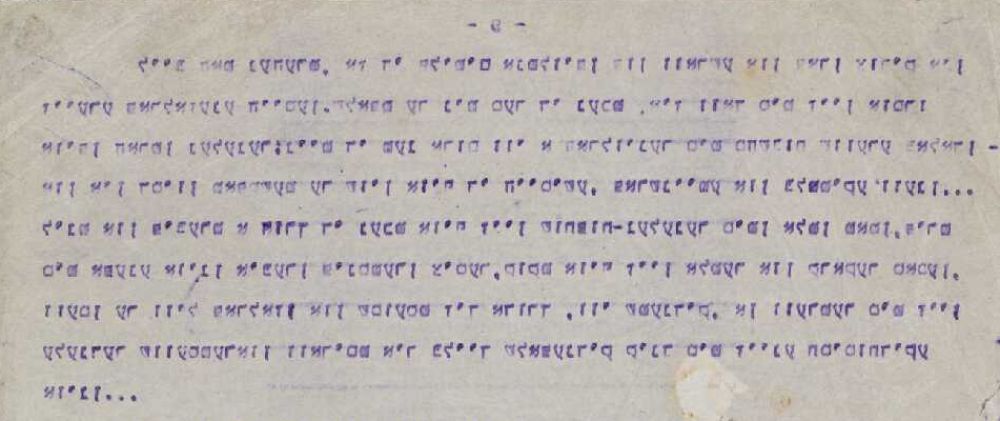- News
- Events
- Oneg Shabbat
- Collections
- Research
- Exhibitions
- Education
- Publishing Department
- Genealogy
- About the Institute
- Bookstore


Izrael Winnik was born in 1899 in Zgierz. Since the 1920s, he had been living in Warsaw. He worked as a teacher and journalist, publishing travel stories and features in ‘Folkscajtung’. He was a supporter of the Bund socialist party.
During the war, he lived at 36 or 37 Miła street. He worked at the Jewish Social Aid Society (ŻTOS) at the Central Sponsorship Commission, which associated committees supporting public kitchens, orphanages and refugee points. He joined the Archive team in the Autumn of 1941.
Winnik must have been a regular associate of Oneg Shabbat, because his name had been appearing in the Banking book (which documented the financial condition of the Archive) 29 times between 16 October 1941 and 19 July 1942. Despite this frequency, only one text signed with his name had been preserved – The departure of Lejb Dembkowski from 1941. It was a typewritten text in Yiddish – we don’t have samples of his handwriting, which could help identify further testimonies written by him. Hersz Wasser mentioned Winnik twice as a regular associate of the Underground Archive of the Warsaw Ghetto (in a note from 1946 and at a Yad Vashem conference in 1964).
The testimony, or rather a literary image – The departure of Lejb Dembkowski is a moving, compassionate story of a young refugee from Bieżuń, who could have not leave his hometown for the rest of his life, were it not for the war. He had found himself in the ghetto with elderly parents, his sister and her child, roaming the streets of Warsaw in search of work and food. Due to lack of employment, he ends up, along with his family, in a refugee point at Miła street, waiting to die.
![winnik_2.jpg [126.33 KB]](https://www.jhi.pl/storage/image/core_files/2022/3/24/54bcf9db9388f198f6e7b7861545c776/jpg/jhi/preview/winnik_2.jpg)
He is sitting at home, next to his elderly, ill father, sees his father reciting psalms, sees his sister trying to peel a potato, scratches a blackened nail against a frozen windowpane, breathes warm air onto it, makes a small hole in a white, shady forest painted by frost, looks outside, like Noah out of his ark. [1]
Having lost all hope for improving his life in the Warsaw Ghetto, Lejb decides to return to Bieżuń and bring his family back there. His relatives give him the most treasured goods: a shirt, some underwear, old socks and new shoes. He gives away his old ones to the guardian of the refugee point.
The description ends with the scene of his mother’s death. Mother is missing Lejb. She looks for him with glassy eyes and asks: When will he return to take her away with him? He promised to come back and take her home. The home is waiting there. Her own soft bed with stacked up pillows, a warm duvet. It is so cold here, the body shivers… she cries in her quiet passing. When will Lejb come back? When will he take her away? She found him: here he is. He walks through snow and mud, down the familiar road to town. Here he comes, it is him, it is Lejb. One more minute, one more moment. Now, she had lost forever both of them: Lejb and her own poor, sad life. [2] (translated by Olga Drenda)
Izrael Winnik is mentioned in the „Destruction of Jewish Warsaw” report from 15 November 1942 as one of the victims of the Great Deportation, which means that he was murdered in the Treblinka extermination camp in the Summer of 1942.
Written by: Anna Majchrowska
Translated by: Olga Drenda
The departure of Lejb Dembkowski has been published in the 33rd volume of the complete edition of the Ringelblum Archive (only in Polish: Getto warszawskie, cz. I).
Footnotes:
[1] Izrael Winnik, The departure of Lejb Dembkowski [in:] The Ringelblum Archive, Vol.33, Getto warszawskie, cz. I, ed. Tadeusz Epsztein, Katarzyna Person, Wyd. Uniwersytetu Warszawskiego, Warszawa 2016, p. 77.
[2] Ibidem, p. 79.
Bibliography:
Aleksandra Bańkowska, Nieznani i mniej znani współpracownicy Ringelbluma, czyli co wynika z odczytania księgi kasowej Oneg Szabat, Kwartalnik historii żydów, grudzień 2015, nr 4 (256).
Archiwum Ringelbluma, t.33, Getto warszawskie, cz. I, red. Tadeusz Epsztein, Katarzyna Person, Wyd. Uniwersytetu Warszawskiego, Warszawa 2016.